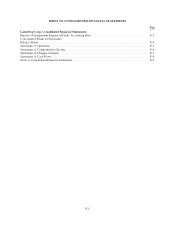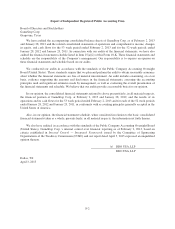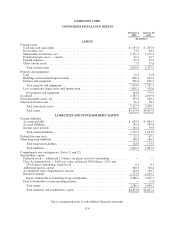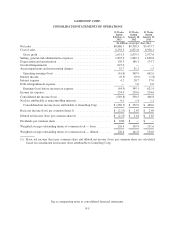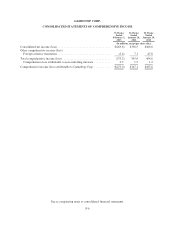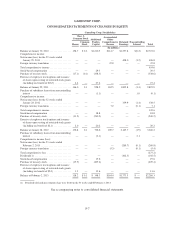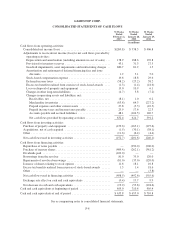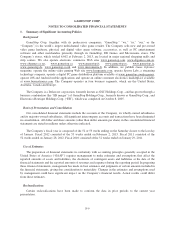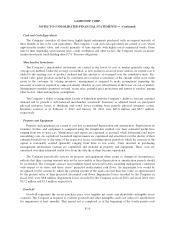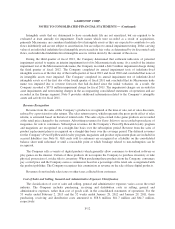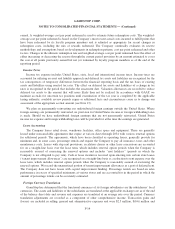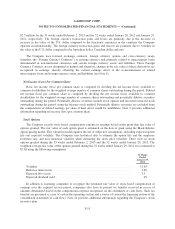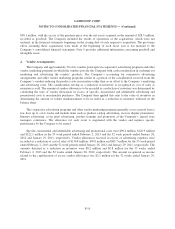GameStop 2012 Annual Report Download - page 86
Download and view the complete annual report
Please find page 86 of the 2012 GameStop annual report below. You can navigate through the pages in the report by either clicking on the pages listed below, or by using the keyword search tool below to find specific information within the annual report.GAMESTOP CORP.
NOTES TO CONSOLIDATED FINANCIAL STATEMENTS — (Continued)
fiscal year or when circumstances indicate the carrying value of the goodwill or other intangible assets might be
impaired. Goodwill has been assigned to reporting units for the purpose of impairment testing. The Company has
four operating segments, the United States, Australia, Canada and Europe, which also define our reporting units
based upon the similar economic characteristics of operations within each segment, including the nature of
products, product distribution and the type of customer and separate management within those regions. The
Company estimates the fair value of each reporting unit based on the discounted cash flows of each reporting
unit. The Company uses a two-step process to measure any potential goodwill impairment. If the fair value of the
reporting unit is higher than its carrying value, then goodwill is not impaired. If the carrying value of the
reporting unit is higher than the fair value, then the second step of the goodwill impairment test is needed. The
second step compares the implied fair value of the reporting unit’s goodwill with its carrying amount. The
implied fair value of goodwill is determined in step two of the goodwill impairment test by allocating the fair
value of the reporting unit in a manner similar to a purchase price allocation used in a business combination and
the residual fair value after this allocation is the implied fair value of the reporting unit’s goodwill. If the carrying
amount of the reporting unit’s goodwill exceeds the implied fair value of its goodwill, then an impairment loss is
recognized in the amount of the excess. If the carrying value of an individual indefinite-lived intangible asset
exceeds its fair value, such individual indefinite-lived intangible asset is written down by the amount of the
excess. During the third quarter of fiscal 2012, the Company determined that sufficient indicators of potential
impairment existed to require an interim goodwill impairment test. As a result of the interim goodwill
impairment test, the Company recorded non-cash, non-tax deductible goodwill impairments for the third quarter
of fiscal 2012 of $107.1 million, $100.3 million and $419.6 million in its Australia, Canada and Europe reporting
units, respectively, to reduce the carrying value of goodwill. The Company completed its annual impairment test
of goodwill as of the first day of the fourth quarter of fiscal 2010, fiscal 2011 and fiscal 2012 and concluded that
none of its goodwill was impaired. For the fiscal 2012 annual impairment test, for each of our United States,
Canada and Europe reporting units, the calculated fair value of each of these reporting units exceeded their
carrying values by more than ten percent and the calculated fair value of our Australia reporting unit exceeded its
carrying value by approximately nine percent. For fiscal 2011, there was a $3.3 million goodwill write-off in the
United States segment as a result of the exiting of a non-core business. Note 9 provides additional information
concerning the changes in goodwill for the consolidated financial statements presented.
Other Intangible Assets
Other intangible assets consist primarily of trade names, leasehold rights, advertising relationships and
amounts attributed to favorable leasehold interests recorded as a result of business acquisitions. Intangible assets
are recorded apart from goodwill if they arise from a contractual right and are capable of being separated from
the entity and sold, transferred, licensed, rented or exchanged individually. The estimated useful life and
amortization methodology of intangible assets are determined based on the period in which they are expected to
contribute directly to cash flows. Intangible assets that are determined to have a definite life are amortized over
that period. Leasehold rights which were recorded as a result of the purchase of SFMI Micromania SAS
(“Micromania”) represent the value of rights of tenancy under commercial property leases for properties located
in France. Rights pertaining to individual leases can be sold by us to a new tenant or recovered by us from the
landlord if the exercise of the automatic right of renewal is refused. Leasehold rights are amortized on a straight-
line basis over the expected lease term not to exceed 20 years, with no residual value. Advertising relationships,
which were recorded as a result of digital acquisitions, are relationships with existing advertisers who pay to
place ads on the Company’s digital Web sites and are amortized on a straight-line basis over 10 years. Favorable
leasehold interests represent the value of the contractual monthly rental payments that are less than the current
market rent at stores acquired as part of the Micromania acquisition or the EB merger. Favorable leasehold
interests are amortized on a straight-line basis over their remaining lease term with no expected residual value.
F-11


